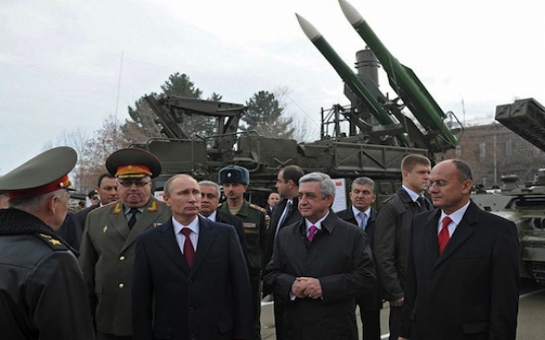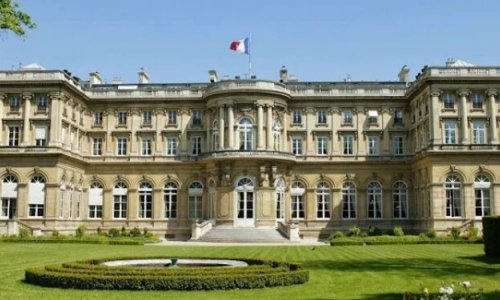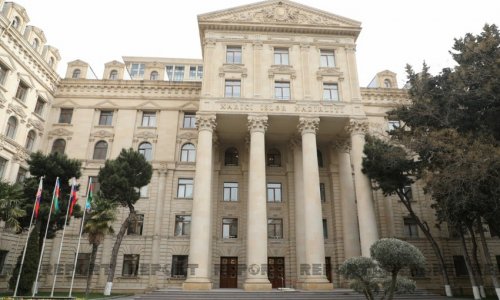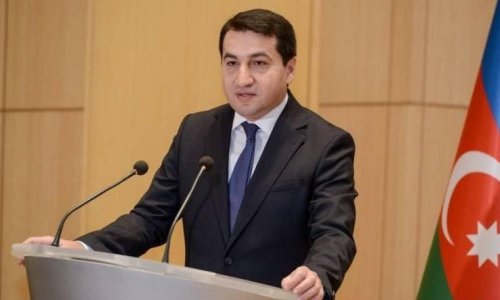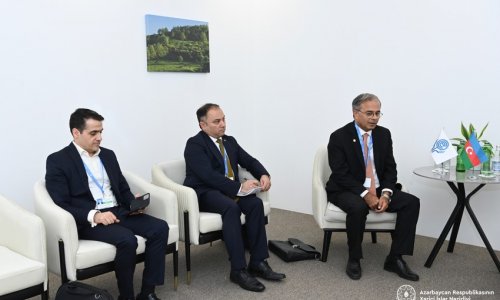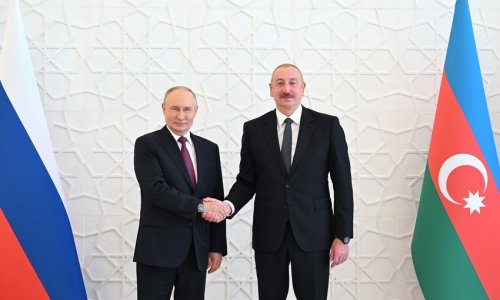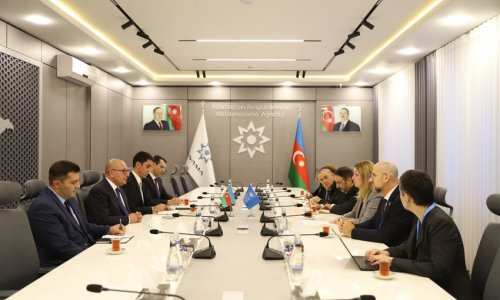Radio Azadliq interview with American analyst Paul Goble.
Mr. Goble served at the U.S. Department of State and also worked at RFE/RL and the Voice of America.He was an analyst at CIA 1979-1983. He also served as special adviser on Soviet nationality issues and Baltic affairs to Secretary of State James Baker. He currently teaches one course at the Institute of World Politics.
Azadliq: The ceasefire regime between Azerbaijan and Armenia will mark 20 years in early May. Did you have any role in the negotiations?
Paul Goble: I was out of the government when both happened. But I remember those events clearly. Achieving a ceasefire was a necessary first step. I felt, however, that the Minsk Group was not the way to find a solution because it included one party, the Russian Federation, which not only wasn’t interested in promoting a solution but had its own reasons for keeping the conflict alive. I said that at the time – I was at the Carnegie Endowment – and I have not changed my view.
Azadliq: Many observers in Azerbaijan think the ceasefire was a mistake for Azerbaijan. Do you agree?
Paul Goble: One can disagree as to when a ceasefire should be signed, but I don’t think it is in the interest of anyone not to have a ceasefire. A ceasefire is not an armistice or a peace. It is a way to allow one or the other to eventually happen. I would like to see peace in the South Caucasus; I fear that even now people are talking about supposed “solutions” that are in fact not going to bring peace but will be only an armistice between wars. Tragically, both of the parties to the ceasefire and the international community have not made good use of the time to move toward a broader settlement.
Azadliq: In the early 1990s, you were suggesting the exchange of territories as one approach to settling the conflict. It was rejected by both Armenia and Azerbaijan. Do you still think this option could bring resolution to the conflict?
Paul Goble: The now infamous Goble Plan was proposed by me in January 1992 as part of a scope note on the conflict I prepared for former US Secretary of State Cyrus Vance prior to his visit to the region. It was based on the notion that in the fluid circumstances immediately following the disintegration of the USSR, border changes might be possible and could be negotiated. If Armenia were to be given Karabakh, I said, then Azerbaijan would have to be compensated by being given Zengazur. That would have created two ethnically homogeneous states without the kind of marginal territories that often are the seedbeds for nationalism. At the time, some in Azerbaijan and Turkey were interested in the idea, but Armenia, Iran and Russia were opposed. With the passage of time – and indeed, very quickly at least from the US point of view (On February 6,1992, the White House issued a statement that the United States would “never recognize any secession from secession on the post-Soviet space.”), all the countries in the region accepted the principle of the sanctity of the territorial integrity of these states. Russia under Vladimir Putin has now violated that principle in Crimea and made even more expansive claims. It is thus possible that the era of border stability in the area is at an end. It is at least under threat.
Azadliq: US officials and mediators make frequent statements that the settlement of the Nagorno Karabakh conflict should be accelerated to avoid another Ukrainian crisis in the region. Do you see any possibility for resolving the conflict now?
Paul Goble: I believe that the international community should do everything it can to promote direct and continuing talks between Baku and Yerevan, talks that should lead to a settlement based on the principles of the integrity of borders and the right of nations to self-determination in this case short of border changes. I am confident that Baku would welcome that. Unfortunately, Yerevan with the support of Moscow, doesn’t. Constant efforts to have direct talks will highlight that. Allowing things to continue only in the Minsk Group format won’t.
Azadliq: Should Nagorno Karabakh be involved in the negotiations?
Paul Goble: Nagorno-Karabakh is not a party to the conflict and should not be involved in them.
Azadliq: What do you see as the key obstacle towards progress in the talks? Is Russia the main factor?
Paul Goble: The key obstacle now as in the past is that Moscow does not want a settlement because it sees itself as benefitting from a continuation of the conflict. If Moscow weren’t interested in a continued conflict, the conflict could be ended at almost any time and very fast. Unfortunately, the Putin regime isn’t interested in a settlement except under one condition – Baku’s transformation from an independent country with a multivalent foreign policy into a satellite of the Russian Federation.
Azadliq: How do you evaluate the CIS? What benefit does Azerbaijan derive from membership? Can the West provide any security guarantees to Azerbaijan or other post-Soviet states?
Paul Goble: I believe that the CIS is a shell organization, that Azerbaijan does not benefit from being a member but doesn't suffer much either. I hope that Azerbaijan and other countries will decide that continuing to be a part of this organization only encourages the worst people in Moscow who want to restore a Moscow-centric empire. Vladimir Putin is a threat to all the countries in the region. His actions in Ukraine are not only an open violation of international law but a threat to all the post-Soviet states. I hope and pray that the US and the EU will extend security guarantees to all the post-Soviet states, including Azerbaijan, as soon as possible.
It is absolutely essential that all these countries move toward greater democracy not only because that will strengthen them internally and distance themselves from the increasingly and menacingly authoritarian Russian state but make them more attractive allies of the West.
Azadliq: Azerbaijan voted for the UN resolution expressing support for Ukraine’s territorial integrity, but abstained from voting when the Parliamentary Assembly of the Council of Europe suspended the Russian delegation’s voting rights. What is your assessment of Azerbaijan's position?
Paul Goble: Azerbaijan did very much the right thing at the UN. I’m sorry I cannot say that I think it was equally correct at PACE. The UN vote, of course, is more important, but it is important to be consistent. Russia is the violator of the rules of the game and must be isolated until it stops playing that role. I think Baku’s balanced foreign policy is a good strategy, but there are times when being too balanced doesn’t work.
Azadliq: Some analysts in Azerbaijan draw parallels between Nagorno Karabakh and Crimea, and wonder why the West is calling on both sides to make compromises in the first case, but makes demands only of Russia in the Ukrainian case. Are these situations comparable?
Paul Goble: I would like to see the United States be far more explicit and careful in its statements. As it happens, sometimes talk about concessions from both sides only confuses the situation. It flows from the natural impulse of diplomats to seek “compromise” in all things. But there are issues on which talk about compromise makes a solution impossible. Armenia must withdraw its forces from the territory of Azerbaijan, just as Russia must withdraw its forces, overt and covert, from Ukraine. Azerbaijan, of course, must protect the rights of all its citizens and residents, including those now living in portions of the country under Armenian occupation.
Azadliq: You once stated that Russia wants a government in Azerbaijan that it can control, and that it could betray Yerevan to achieve this. What did you mean?
Paul Goble: I like to quote the Azerbaijani commentator who said that in the Caucasus, for Moscow, Georgia is the tool, Armenia is the way, and Azerbaijan is the prize. If Moscow could have a government in Baku that would do its bidding and tightly ally itself with the Russian Federation on all important issues, there is no question in my mind that the Kremlin would “betray” the Armenians in an instant. For Moscow, Azerbaijan really is the prize. Fortunately, I don’t think the Russian government is going to win it. Unfortunately, that means Moscow will continue to support the status quo rather than a settlement.
Azadliq: Very often, Baku dismisses criticism of its human rights record by referring to the conflict in Nagorno-Karabakh. Can Azerbaijan subordinate democratization to the demands of the conflict?
Paul Goble: Former Azerbaijani President Heydar Aliyev once said to me that to be a democratic country one must first be a country. He was right. It is critically important that Azerbaijan do what it must to remain an independent country. But I believe a major part of that task now involves moving toward greater human rights and democratization. Those will strengthen Azerbaijani statehood more than anything else. Not moving in that direction, I fear, will only weaken it.

